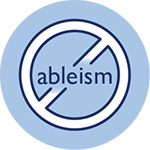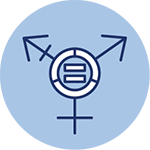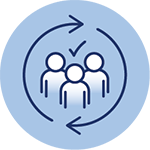PRINCIPLES
To achieve the six objectives described above, USAID will uphold the following seven operating principles: accessibility, accountability, anti-ableism, do no (more) harm, gender equality, nondiscrimination, and nothing without us. These operating principles are intended to align with and complement the principles in Chapter 201 of USAID’s Automated Directives System (ADS): Program Cycle Operational Policy. USAID’s Operating Units should apply the following principles across sectors and across the Program Cycle at every opportunity. Consideration should also be given to the interrelated and interdependent application of these principles. For example, in addressing how to uphold the principle of accessibility in USAID programs, the principle of nothing without us should be applied so that persons with disabilities are central to informing and guiding what constitutes effective and meaningful access.
Any issue affecting humanity is necessarily of relevance to persons with disabilities.

Accessibility is the design, construction, development, and maintenance of facilities, information and multimodal communication and technology, programs, and services so that all people, including persons with disabilities, can fully and independently use them. Accessibility includes the provision of accommodations and modifications to ensure equitable access to and participation in activities for persons with disabilities, the reduction or elimination of barriers to equitable opportunities, a commitment to ensuring that persons with disabilities can independently access every outward-facing and internal activity as well as electronic spaces, and the pursuit of best practices such as UD.25

Accountability reflects USAID’s commitment to disability-inclusive development, humanitarian, and peacebuilding assistance that is effective, responsive, sustainable, transparent, and accountable to persons with disabilities and their representative organizations. Achieving the objectives of the Disability Policy is a shared Agency responsibility and depends on the contributions and collective commitment of all our staff. Generation of data and evidence to facilitate tracking of progress, not merely tracking of inputs or outputs, is essential to ensuring effective outcomes. All USAID staff—including Senior officials; Mission Directors; Bureau leaders; Center, Office, and Hub directors; technical team leaders; and team members—are accountable (including through employee evaluations as appropriate) for implementing this Policy across their portfolios as well as for defining specific goals within the Agency’s strategies and programming that align with the objectives of this Policy.

Anti-ableism is the intentional use of strategies, theories, actions, and practices to challenge and counter pervasive discrimination and exclusion of persons with disabilities based on ableist norms that devalue persons with disabilities relative to non-disabled persons and are rooted in beliefs that “typical” abilities are superior and that persons with disabilities need to be changed to fit a social ideal of what is “normal” or “typical” rather than being respected as a natural part of human diversity.

Do no (more) harm is the undertaking of development, humanitarian, and peacebuilding assistance interventions that do not put participants at greater risk than would be the case without the intervention. Do no more harm acknowledges that harm may have already occurred, and the goal then is to ensure that more harm does not occur beyond the point of intervention and that, to the extent possible, actions are undertaken to mitigate and address past harm that may have occurred.

Gender equality is the equal ability to attain and benefit from human rights, freedoms, socially valued goods, opportunities, and resources by all individuals independent of their sex, gender expression, and gender identity. Gender equality is more than parity in numbers and laws on the books. Achieving gender equality means that all individuals—women and girls, men and boys, and gender-diverse individuals—can meaningfully contribute to and participate in their societies with dignity.

Nondiscrimination is the basic foundation of USAID’s inclusive development approach. All Agency programs should ensure nondiscriminatory access for all potential beneficiaries and must comply with the Nondiscrimination for Beneficiaries Policy. USAID staff must not discriminate against any participant or potential participant, including by withholding, adversely impacting, or denying equitable access to benefits or services on the basis of disability. USAID’s award terms and conditions place similar nondiscrimination requirements on our implementing partners. Nondiscrimination, a basic requirement for the U.S. government, is not by itself sufficient to ensure inclusion, but rather helps ensure that programs do not cause further exclusion. We encourage all in-country partners to work to end discrimination against persons with disabilities and promote equity for persons with disabilities in their country contexts.

Nothing Without Us is the meaningful engagement of stakeholders in all aspects and stages of the design, decision-making, implementation, and evaluations processes of programming, policies, or actions. Originally coined as “nothing about us without us” by disability rights activists in the 1990s, through time disability rights advocates such as former Special Rapporteur on the Rights of Persons with Disabilities Catalina Devandas Aguilar started shifting usage to “nothing without us.” At the 2022 Global Disability Summit, disability advocates called for a change to “nothing without us,” in recognition that any issue affecting humanity is necessarily of relevance to persons with disabilities. The principle has become an element of inclusive practices across a variety of fields and applications, is consistent with USAID’s commitment to locally led and inclusive development, and is more effectively realized when we engage in development interventions with rather than for persons with disabilities.
DISABILITY INCLUSION IN ACTION
USAID’s “Leading for Independent Living: Building Resources and Partnerships for Inclusive Communities in Armenia” activity supported establishment and operation of Independent Living Resource Centers (ILRCs) in two regions of Armenia . ILRCs are community-based, cross-disability organizations run by and for persons with disabilities to support their human right to live independently and be included in the community. Such organizations exist around the world and are part of the larger “independent living” movement founded by disability rights advocates such as Ed Roberts and Judy Heumann in the United States in the 1960s and 1970s . The ILRCs founded through this USAID-supported activity offer peer-led, rights-based services and resources to empower Armenians with disabilities to live independently, advocate for their rights, and participate fully in their communities.
“We created an environment where persons with disabilities were able to teach each other, to learn from each other, and to acquire a multitude of skills. So, among the achievements of the [ILRC], we can also highlight the fact that State authorities have started to approach the needs, requirements, and demands of persons with disabilities more seriously, and they’re trying to ensure better representation and involvement for persons with disabilities.”
—Equal Rights, Equal Opportunities Organization’s ILRC Advocacy Coordinator with a disability
Footnotes
Universal design (UD) is the design of products, environments, programs, and services to be usable by all people to the greatest extent possible without the need for adaptation or specialized design. UD does not exclude provision of assistive devices for particular groups of persons with disabilities where this is needed. Back to text
Previous page - Background | Next page - Data Learning and Evidence
